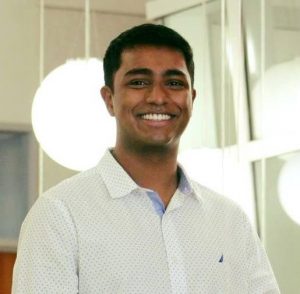
PhD candidates Niharika Shimona D’Souza and Naresh Nandakumar – both members of The Neural Systems Analysis (NSA) Lab, which Department of Electrical and Computer Engineering assistant professor Archana Venkataraman is the PI for – have had papers selected to be presented at the International Conference on Medical Image Computing & Computer Assisted Intervention (MICCAI).
The virtual conference is set to take place from October 4-8. D’Souza will present her paper at the main MICCAI conference, while Nandakumar will be delivering an oral presentation of his research at the MICCAI workshop titled Machine Learning in Clinical Neuroimaging (MLCN).
“MICCAI is one of the premier medical imaging conferences, so Niharika and Naresh have an exciting opportunity to showcase their research to experts in the field,” Venkataraman said. “Specifically, Niharika has developed an innovative way to combine traditional optimization techniques with deep learning to predict behavioral deficits in autism. Naresh has developed a unique deep learning architecture to identify the ‘eloquent cortex’ in the brain, thus enabling faster and safer neurosurgeries. Congrats to both of them!”

Niharika Shimona D’Souza
Titled “A Deep-Generative Hybrid Model to Integrate Multimodal and Dynamic Connectivity for Predicting Spectrum-Level Deficits in Autism,” D’Souza’s paper presents a novel framework to predict behavioral deficits in patients with autism by decoding the structural and functional organization of their brain. The group combined two complementary views of the brain, as given by DTI (Diffusion Tensor Imaging) and rs-fMRI (resting state functional Magnetic Resonance Imaging), and relate them to symptom severity in autistic patients.
By combining ideas from generative modelling and deep learning, the mathematical framework outperforms several state-of-the-art algorithms to provide a more holistic understanding of the disorder.
“I have been associated with the MICCAI community since 2018, and the conference has always been the highlight of my graduate tenure,” D’Souza said. “I’m extremely excited to be presenting as an author once again at MICCAI 2020. The conference has been a great way to share ideas with and hear from some of the most brilliant minds in the community. I look forward to this year’s virtual conference experience, which should be unique in its own way.”

Naresh Nandakumar
A common preoperative measure for people with brain tumor removal procedures is to map where their language and motor networks are in their brain, to avoid during surgery. Nandakumar’s paper, which is titled “A Multi-Task Deep Learning Framework to Localize the Eloquent Cortex in Brain Tumor Patients Using Dynamic Functional Connectivity,” focuses on a newly-developed, fully automated method to find these areas simultaneously using a specifically challenging imaging modality called resting-state fMRI, which captures co-activations in the brain at rest.
The group’s method uses different deep learning components to achieve this goal.
“I am excited to be giving an oral presentation at the MLCN workshop this year, as I have never attended this workshop and am curious to see what other types of work has been published there,” Nandakumar said. “Though the conference will be virtual, hopefully we can meet new researchers!”